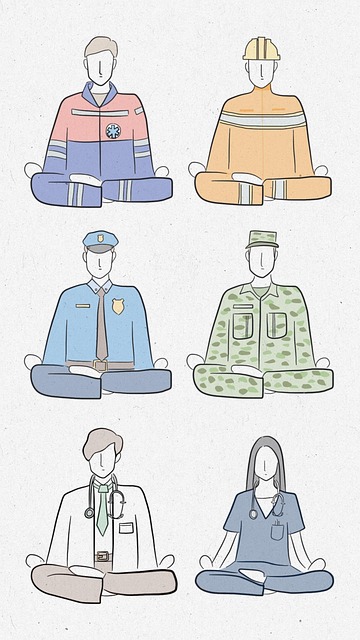Mental wellness groups offer a supportive environment for individuals to navigate major life transitions and manage mental health issues through structured discussions, crisis intervention, and cultural competency training. Facilitators utilize techniques like active listening, mindfulness, and empathy-building exercises to enhance self-awareness and resilience. Success is measured using diverse assessment tools, and continuous improvement ensures the therapy meets all participants' needs. Superior Major Life Transitions Therapy, combined with risk management and education programs, creates a supportive community for optimal mental wellness.
Mental wellness groups offer a powerful support system, fostering recovery and growth through shared experiences. In this article, we explore effective facilitation techniques for these dynamic environments, focusing on creating safe spaces and navigating challenging topics like major life transitions. We delve into active listening, supportive communication strategies, and assessment methods to measure the profound impact of group therapy. By understanding these principles, facilitators can enhance therapeutic outcomes, providing superior support during pivotal moments in participants’ lives.
- Understanding Mental Wellness Groups: Creating a Safe Space
- Facilitation Techniques for Major Life Transitions
- Engaging Participants: Active Listening and Supportive Communication
- Measuring Success: Assessment and Continuous Improvement in Group Therapy
Understanding Mental Wellness Groups: Creating a Safe Space

Mental wellness groups offer a unique and powerful environment for individuals to connect, support one another, and navigate challenges. These groups are designed to create a safe haven where members can openly discuss their experiences and emotions related to various mental health topics. The dynamic among peers with shared struggles fosters camaraderie and understanding, breaking down the isolation often associated with mental health issues.
Group facilitators play a crucial role in establishing this safe space. Through skilled facilitation, they guide participants through exercises that enhance self-awareness, encourage active listening, and promote empathy. Techniques such as crisis intervention guidance and structured discussions on major life transitions can help individuals develop coping strategies and build resilience. Healthcare provider cultural competency training is also essential to ensure inclusivity and respect for the diverse backgrounds of group members.
Facilitation Techniques for Major Life Transitions

Navigating major life transitions can be a significant challenge for individuals, often leading to heightened stress and emotional turmoil. As a mental wellness group facilitator, employing specialized techniques can greatly enhance the therapeutic process during these transformative periods. One effective approach is incorporating structured discussions that encourage participants to share their experiences, fostering a sense of community and support. This not only normalizes their feelings but also provides valuable peer-to-peer learning opportunities.
Additionally, integrating stress management strategies tailored to life transitions can empower individuals with healthy coping mechanisms. Encouraging practices such as mindfulness, relaxation techniques, and positive thinking exercises allows participants to develop a more adaptive mindset. A crucial aspect of successful facilitation involves conducting thorough risk assessments for mental health professionals to ensure the safety and well-being of everyone involved, especially when addressing potential triggers or vulnerabilities associated with significant life changes.
Engaging Participants: Active Listening and Supportive Communication

Engaging participants actively is key to facilitating effective mental wellness groups. One of the most powerful tools in a facilitator’s arsenal is active listening. It involves giving your full attention to each participant, acknowledging their feelings, and validating their experiences. This simple act fosters trust and creates a safe space where individuals feel comfortable sharing their thoughts and emotions openly. By practicing superior major life transitions therapy techniques, facilitators can help participants process challenging experiences and build resilience.
Effective communication is another critical aspect of group facilitation. Using mind over matter principles, facilitators encourage positive self-talk and reframe negative thoughts. Self-awareness exercises and empathy building strategies are also valuable tools to enhance understanding among group members. These techniques not only strengthen connections but also enable participants to offer meaningful support to one another, creating a supportive network that reinforces mental wellness.
Measuring Success: Assessment and Continuous Improvement in Group Therapy

Measuring success in group therapy sessions is a multifaceted process that goes beyond mere attendance or satisfaction surveys. Effective facilitators employ diverse assessment tools to gauge progress, tailored to the specific needs and goals of the group, which often revolves around navigating Major Life Transitions (MLTs). These assessments can include pre-post tests, self-report questionnaires, and observational checklists designed to capture improvements in symptoms, social functioning, and coping strategies.
Continuous improvement is a cornerstone of superior group therapy facilitation. By analyzing assessment data, therapists can identify what’s working well and areas needing enhancement. This informs adaptive planning, ensuring the therapeutic environment remains responsive and effective for all participants. Moreover, integrating insights from Risk Management Planning for Mental Health Professionals, as well as designing Mental Health Education Programs or even developing Public Awareness Campaigns, allows facilitators to broaden their impact beyond individual therapy, fostering a more supportive community overall.
Mental wellness group facilitation plays a pivotal role in creating supportive environments for individuals navigating various challenges. By employing techniques like active listening and assessment tools, facilitators can enhance participation and measure the success of therapy, especially during major life transitions. This approach ensures that groups foster meaningful connections and provide effective support, ultimately contributing to improved mental health outcomes. Incorporating these facilitation techniques can revolutionize group therapy, making it a powerful tool for personal growth and resilience, particularly in addressing Superior Major Life Transitions Therapy needs.










